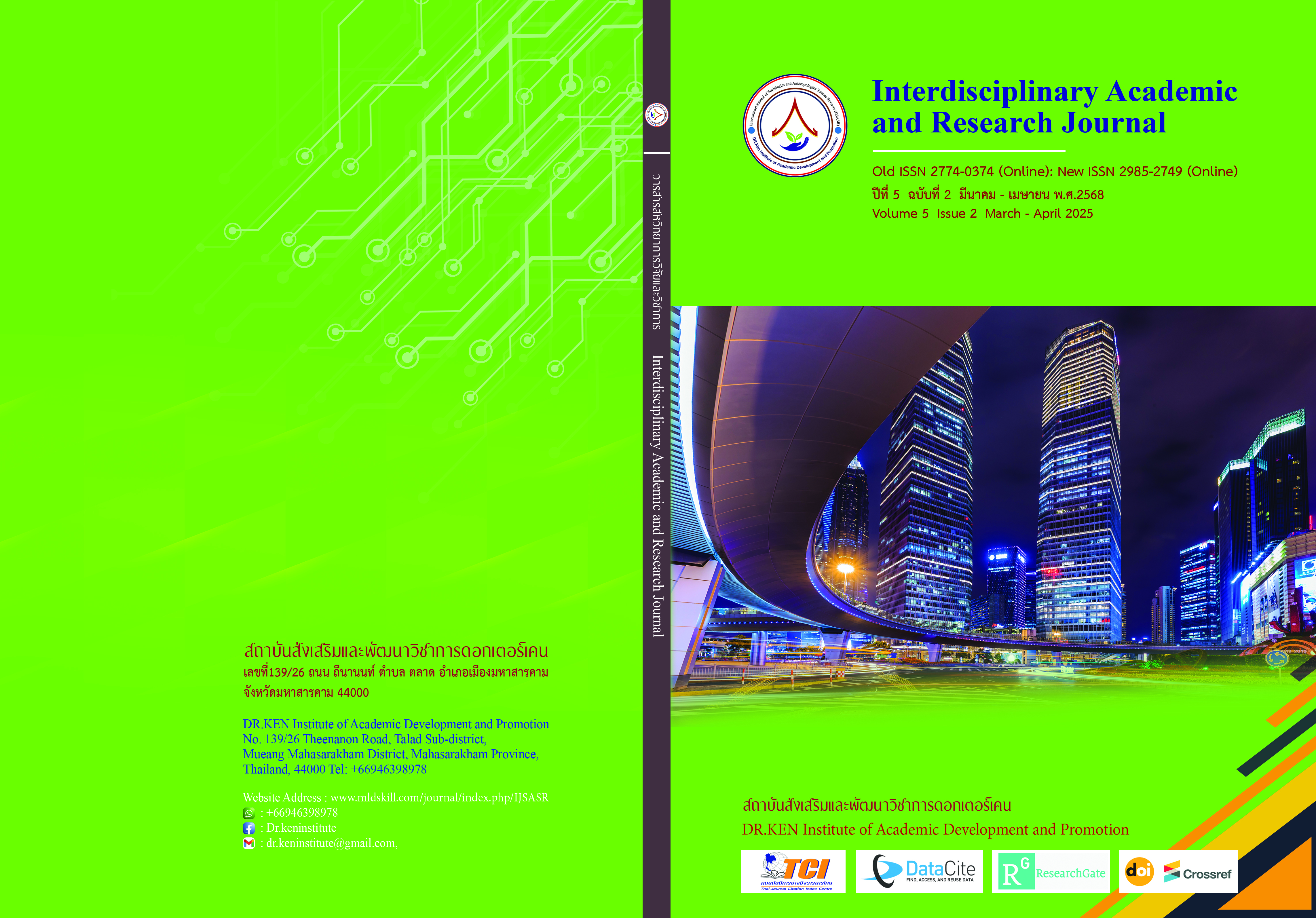Management Guidelines for Supplementary Vocational Courses of the Community Learning Centers in Northern Thailand
DOI:
https://doi.org/10.60027/iarj.2025.282097Keywords:
Guidelines for Management, Supplementary Vocational Course, Community Learning Centers in Northern ThailandAbstract
Background and Aims: Community learning centers play a vital role in organizing learning activities, promoting lifelong education, and supporting community livelihoods. However, managing supplementary vocational training programs remains challenging and requires development strategies to ensure sustainability and meet labor market demands. This research aims to propose management strategies for supplementary vocational courses at community learning centers in Northern Thailand.
Methodology: This research employed a qualitative approach, collecting data from 9 key informants using stratified purposeful sampling quota sampling. In-depth interviews were conducted as the main data collection method, with the interview guide serving as the primary tool. The data were analyzed using content analysis to address the research objectives.
Results: The findings reveal that these management strategies consist of two main components: 1) Managing the supplementary vocational curriculum, including Man management, Materials management, Money management, and Management; and 2) Key success factors in curriculum management, which involve analyzing labor market demands, adopting sustainability practices, fostering collaboration with stakeholders from all sectors, and evaluating and monitoring learning outcomes.
Conclusion: The management guidelines for supplementary vocational courses at community learning centers in Northern Thailand, as derived from this research, can be applied to enhance the efficiency of workforce development and the sustainability of these centers. These guidelines focus on key areas such as resource management, personnel, budgeting, and overall administration. They can be utilized by community learning center administrators, educational planners, and policymakers to improve the management of vocational courses in line with labor market demands. This will contribute to sustainable economic and social development within the communities.
References
กรมการพัฒนาชุมชน. (2551). คู่มือศูนย์เรียนรู้ชุมชน. กรุงเทพฯ : กรมการพัฒนาชุมชน.
กรมการพัฒนาชุมชน. (2561). รายงานประจำปี 2564 กรมการพัฒนาชุมชน. กรุงเทพฯ : กระทรวง มหาดไทย.
กรมส่งเสริมการเรียนรู้. (2566). รายงานประจำปี 2564 กรมส่งเสริมการเรียนรู้. กรุงเทพฯ : กระทรวงศึกษาธิการ
กระทรวงการพัฒนาสังคมและความมันคงของมนุษย์. (2564). รายงานสถานการณ์ทางสังคมและ ความมั่นคงของมนุษย์ระดับประเทศ ประจำปี 2564. กรุงเทพฯ : กระทรวงการพัฒนาสังคมและความมั่นคงของมนุษย์.
กระทรวงศึกษาธิการ. (2546). พระราชบัญญัติการศึกษาแห่งชาติ พ.ศ.2542 และที่แก้ไขเพิ่มเติม (ฉบับที่ 2) พ.ศ. 2545. กรุงเทพฯ : กระทรวงศึกษาธิการ.
กระทรวงศึกษาธิการ. (2551). แนวทางการพัฒนา การวัดและประเมินคุณลักษณะอันพึงประสงค์ ตามหลักสูตรแกนกลางการศึกษาขั้นพื้นฐาน พุทธศักราช 2551. กรุงเทพฯ: สำนักวิชาการและมาตรฐานการศึกษา สำนักงานคณะกรรมการการศึกษาขั้นพื้นฐาน.
กระทรวงศึกษาธิการ. (2552). ระเบียบกระทรวงศึกษาธิการ ว่าด้วยศูนย์การเรียนชุมชน พ.ศ. 2552. กรุงเทพฯ : กระทรวงศึกษาธิการ.
ชลชาติ สร้อยทอง. (2562). ปัจจัยที่ส่งผลต่อผลสัมฤทธิ์ทางการเรียนของนักเรียนชั้นมัธยมศึกษาปีที่ 3 โรงเรียนปทุมคงคา. การประชุมวิชาการระดับชาติและนานาชาติ มหาวิทยาลัยศรีปทุม ครั้งที่ 14, 19 ธันวาคม 2562.
ณฐกร ลิ่มสุวรรณโรจน์, ดร.ทวีศักดิ์ กฤษเจริญ, และ ดร.วินัย หอมสมบัติ. (2558). เส้นทางของการพัฒนาองค์กรแห่งนวัตกรรมอย่างยั่งยืน กรณีศึกษา : มหาวิทยาลัยเทคโนโลยีพระจอมเกล้าธนบุรี. มหาวิทยาลัยเทคโนโลยีพระจอมเกล้าธนบุรี
ประไพพิมพ์ สุธีวสินนนท์ และ ประสพชัย พสุนนท์. (2559). กลยุทธ์การเลือกตัวอย่างสำหรับการวิจัยเชิงคุณภาพ.วารสารปาริชาต มหาวิทยาลัยทักษิณ, 29 (2), 32-48.
พระราชบัญญัติส่งเสริมการพัฒนาฝีมือแรงงาน (ฉบับที่ 2)พ.ศ.2557. (2557, 26 ธันวาคม). ราชกิจจานุเบกษา. เล่ม 131 ตอนพิเศษ 87ก, หน้า 19.
พระราชบัญญัติส่งเสริมการพัฒนาฝีมือแรงงาน พ.ศ.2545. (2545, 1 ตุลาคม). ราชกิจจานุเบกษา. เล่ม 119 ตอนที่ 98/1ก, หน้า 1.
พันธ์ศักดิ์ แสนพรมมา, สุชาติ ลี้ตระกูล, แสงระวี ณ ลำพูน และ กัมพล ไชย์นันท์. (2562). รูปแบบการบริหารจัดการของศูนย์การเรียนรู้ชุมชนเพื่อส่งเสริมกระบวนการเรียนรู้ของประชาชนในจังหวัดพะเยา. วารสารนาคบุตรปริทรรศน์ มหาวิทยาลัยราชภัฏนครศรีธรรมราช, 11(2), 168-177.
รัญชิดา จุลรักษา. (2564). การศึกษาปัจจัยการพัฒนาองค์กรอย่างยั่งยืนที่มีผลต่อความพึงพอใจและความสำเร็จของ องค์กรผ่านการรับรู้ได้ของพนักงานภายในบริษัท ไปรษณีย์ไทย จำกัด (สำนักงานใหญ่) ตามแนวคิดภาวะผู้นำอย่างยั่งยืน (Sustainable Leadership).ปริญญาการจัดการมหาบัณฑิต มหาวิทยาลัยมหิดล.
วรธา มงคลสืบสกุล. (2565). แนวทางการขับเคลื่อนนโยบายสู่การพัฒนาทักษะแรงงาน เพื่อรองรับการเปลี่ยนแปลงหลังยุคโควิด-19. วารสารวิจัยมหาวิทยาลัยเวสเทิร์น มนุษยศาสตร์และสังคมศาสตร์. 8(1), 283-298.
สมเดช มุงเมือง. (2560). การบริหารทรัพยากรมนุษย์ (พิมพ์ครั้งที่ 3). เชียงราย : ฝ่ายเอกสารตำราศูนย์พัฒนาธุรกิจ มหาวิทยาลัยราชภัฎเชียงราย.
สิตาภา เกื้อคลัง. (2561). องค์ประกอบและแนวทางการส่งเสริมการจัดการเรียนรู้ตลอดชีวิต ของกศน.ตำบล (FACTORS AND GUIDELINES TO FACILITATE LIFELONG LEARNING IN NON-FORMAL AND INFORMAL EDUCATION SUB-DISTRICT CENTERS). บัณฑิตวิทยาลัย มหาวิทยาลัยศิลปากร.
สุกิจ อัครมหาเสนาวงศ์, สุวดีอุปปินใจ, ไพรภ รัตนชูวงศ์ และ ประเวศ เวชชะ. (2565). แนวทางการบริหารจัดการเพื่อพัฒนาสมรรถนะครูด้านดิจิทัลในโรงเรียนประถมศึกษาขนาดเล็ก. Journal of Modern Learning Development. 7 (2), 1-18.
สุธาวี กลิ่นอุบล. (2562). การศึกษาการมีส่วนร่วมของชุมชนต่อความสำเร็จในการพัฒนาชุมชนตามแนวทาง ปรัชญาของเศรษฐกิจพอเพียง บ้านหัวเขาจีน ตำบลห้วยยางโทน อำเภอปากท่อ จังหวัดราชบุรี. วิทยานิพนธ์ศึกษาศาสตรมหาบัณฑิต สาขาวิชาพัฒนศึกษา. บัณฑิตวิทยาลัย: มหาวิทยาลัยศิลปากร.
สุนิสา ฮวบกอง. (2556) การมีส่วนร่วมของประชาชนในการพัฒนาท้องถิ่น : กรณีศึกษาองค์การบริหารส่วนตำบลหนองขาม อำเภอหนองหญ้าไซ จ.สุพรรณบุรี. สาขาวิชารัฐประศาสนศาสตร์. บัณฑิตวิทยาลัย: มหาวิทยาลัยศิลปากร.
หนึ่งฤทัย มั่นคง และคณะ. (2562). การมีส่วนร่วมของชุมชนในการบริหารสถานศึกษาในยุค Thailand 4.0 (School Administration Communities Participation in Thailand 4.0). วารสารอิเล็กทรอนิกส์ Veridian มหาวิทยาลัยศิลปากร (มนุษยศาสตร์สังคมศาสตร์และศิลปะ), 12(2), 444-458.
Daft, R.L. (2018). Organization theory and design. Boston, MA : Cengage Learning.
McKim, C. (2023). Meaningful Member-Checking: A Structured Approach to Member Checking. American Journal of Qualitative Research, 7(2), 41-52.
Mintzberg, H. (2018). Strategy Safari : A Guided Tour Through the Wilds of Strategic Management. Free Press.
Singh, S., & Sharma, R. K. (2562). Man, Materials, Money and Management : What is the most important pillar of management. International Journal of Social Sciences and Humanities Review, 9(1), 95-102.
United Nations Development Programme. (2018). UNDP Annual Report 2018 Kenya. United Nations Development Programme.
Downloads
Published
How to Cite
Issue
Section
License
Copyright (c) 2025 Interdisciplinary Academic and Research Journal

This work is licensed under a Creative Commons Attribution-NonCommercial-NoDerivatives 4.0 International License.
Copyright on any article in the Interdisciplinary Academic and Research Journal is retained by the author(s) under the under the Creative Commons Attribution-NonCommercial-NoDerivatives 4.0 International License. Permission to use text, content, images, etc. of publication. Any user to read, download, copy, distribute, print, search, or link to the full texts of articles, crawl them for indexing, pass them as data to software, or use them for any other lawful purpose. But do not use it for commercial use or with the intent to benefit any business.
















.png)


